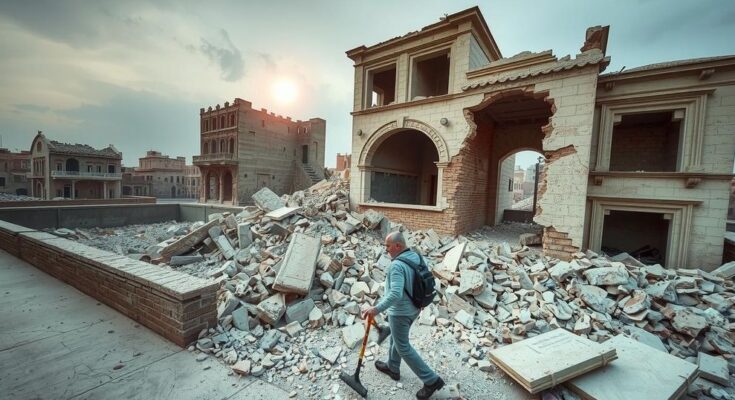The article discusses the rapid decline of the Assad regime in Syria following the recent earthquakes and the rise of Hayat Tahrir al-Sham (HTS). It highlights the implications for regional stability, the reactions of foreign powers, and the prospects for a new Syrian political landscape. The response of the Syrian populace reflects hope for reconciliation, despite significant challenges ahead.
The unexpected swift decline of the Assad regime in Syria has left many, including longstanding allies like Russia and Iran, in a state of astonishment. It was not until the advance of Hayat Tahrir al-Sham (HTS), which captured Aleppo and proceeded to the heart of Damascus, that the regime’s fragility became evident. With Bashar al-Assad seeking refuge in Moscow, the immediate question arises: How will the political landscape evolve in Syria?
The future remains uncertain as HTS’s leader advocates for a national dialogue free from foreign meddling. This proposed dialogue points to the necessity for stability, a functional central government, and the urgency to prevent violent territorial disputes among different factions. It is noteworthy that Assad’s prime minister has expressed a willingness to collaborate with this emerging power. If Syria manages to navigate away from a power void akin to that created by the United States in Iraq, it could potentially avoid enduring instability.
Russia and Iran emerge as the principal losers in this upheaval. However, the winners in this situation are less clear-cut. Nations such as Turkey and Israel display ambitions to exploit the unfolding circumstances, yet they too face heightened risks associated with instability in Syria that could compromise their border security. Meanwhile, a strong Syrian government would likely prioritize the restoration of its territorial integrity. Furthermore, potential fragmentation of Syria into autonomous regions could provoke increased tension in the surrounding area, notably regarding the Kurdish regions adjacent to Turkey. President Recep Tayyip Erdogan might seem empowered by the decline of Putin and Iran, but the historical context of his reliance on these powers cannot be overlooked.
The widespread eruption of joy among Syrians, both domestically and in diaspora, signifies a moment of relief. However, the arduous journey of dismantling the regime and achieving reconciliation among diverse societal groups remains ahead. The challenges of state restoration and nationwide reconstruction will require extensive effort. The hope is that the Syrian people will be granted the opportunity to rebuild their nation.
The article examines the dramatic changes in Syria following the recent earthquakes compounded by political upheaval, particularly the rapid downfall of the Assad regime. The shift in power dynamics raises questions regarding the future governance of Syria, the potential for a stable state, and the roles of various foreign powers. Observers are keenly assessing how these changes may affect regional stability and international relations in the Middle East.
In summary, the unforeseen collapse of the Assad regime has prompted significant political shifts within Syria, leading to a potential new order under HTS. While Russia and Iran suffer notable setbacks, the aspirations of regional powers like Turkey and Israel are fraught with adversity. The joy among Syrians reflects a collective desire for change, yet the path to stability and reconciliation will be complex and demanding, requiring an inclusive approach from all factions involved.
Original Source: www.ekathimerini.com




